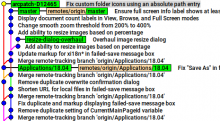Hi!
I have the vague feeling something is wrong with the git server(s) lately.
For example I'm experiencing unexpected merge necessities. see D12028.
It looks like there's a huge delay between anongit and cgit.
E.g. D12165 landed Thu, Apr 12, 23:19 it immediately appeared on cgit, but wasn't pulled until ~ 9:00 CETS today. Apparently it was not available at 5:00 see D12165.
Maybe related, but I'm experiencing this for much longer:
$ git co master Ihr Branch ist auf demselben Stand wie 'origin/master'. (German for branch is up-to-date)
Nevertheless sometimes git pull does pull something.

